Making Tulsi Mala Best Process
Making Tulsi Mala – The Complete Process, Tradition & Spiritual Craftsmanship
Making Tulsi Mala is not just a task of shaping wooden beads; it is a sacred discipline deeply rooted in devotion, tradition, and spiritual respect. For centuries, devotees have regarded Making Tulsi Mala as a divine service to Tulsi Devi, the beloved consort of Lord Krishna. Every bead symbolizes purity, protection, and spiritual upliftment. Those involved in Making Tulsi Mala understand that they are not merely crafting a product—they are participating in a spiritual offering that supports millions of devotees worldwide.
The art of Making Tulsi Mala has been practiced for generations in Vrindavan, Mayapur, and various holy regions where Tulsi grows abundantly. Artisans consider the process a form of meditation. The purity and devotion behind Making Tulsi Mala make these malas spiritually powerful, sattvic, and highly beneficial for chanting, meditation, and daily worship. Devotees often ask how the mala is created and why the traditional method of Making Tulsi Mala is considered so special. To understand this, we must go through the sacred journey of Tulsi wood—from a holy plant to a divine spiritual necklace.
The Spiritual Foundation Behind Making Tulsi Mala (Mention 6/20)
The first and most important step in Making Tulsi Mala is understanding the spiritual value of Tulsi itself. Tulsi is considered the manifestation of Goddess Vrinda, and wearing a Tulsi Mala is believed to protect the soul from negative influences, enhance devotion, and increase concentration during japa. For this reason, artisans maintain a pure state of mind when Making Tulsi Mala. Clean surroundings, simple living, and chanting of mantras are integral parts of the process.
Scriptures glorify Tulsi as the most sacred plant, and thus the process of Making Tulsi Mala is always done respectfully. No machines are used in traditional Making Tulsi Mala, because machines cannot replicate the purity, emotion, and devotion involved in handcrafted malas. This spiritual atmosphere becomes infused in every bead.
Step-by-Step Guide to Making Tulsi Mala
Step 1: Selecting the Tulsi Wood
The journey of Making Tulsi Mala begins with selecting naturally dried stems of Tulsi. Artisans never cut green branches. Only mature, dry stems that have completed their natural life cycle are used. This respectful approach ensures that Making Tulsi Mala does not harm the sacred plant.
Two primary varieties are selected during Making Tulsi Mala:
- Rama Tulsi – Light, smooth, and aromatic
- Krishna Tulsi – Darker, stronger, and preferred for premium malas
The quality of stems chosen greatly influences the beauty and durability of the final mala.
Step 2: Cleaning and Preparing the Stems
Once collected, the stems are washed or wiped clean. Purification is essential in Making Tulsi Mala, because impurities can affect both appearance and spiritual vibration. Many artisans chant sacred mantras while cleaning the stems, continuing the devotional tradition of Making Tulsi Mala.
Step 3: Cutting the Beads
The next stage in Making Tulsi Mala involves cutting the stems into tiny bead-sized pieces. This must be done with precision to maintain uniformity. Symmetry is important, and artisans take great care to ensure that each bead reflects the perfection expected in Making Tulsi Mala.
Step 4: Drilling the Beads
Drilling is the most delicate stage of Making Tulsi Mala. The holes have to be perfectly centered without cracking the soft Tulsi wood. Skilled hands and experience are crucial. A single mistake can destroy a bead, so patience is essential in Making Tulsi Mala.
Step 5: Smoothing and Polishing
After drilling, the beads are polished manually. Smooth beads contribute to comfort while wearing and ease while chanting. This stage of Making Tulsi Mala ensures that the mala feels naturally soft, soothing, and energetic.
Step 6: Preparing the Thread
Cotton, nylon, or silk thread is selected based on the type of mala being made. Thread preparation is another step in Making Tulsi Mala that requires care. Strong threads ensure durability, especially for japa malas that are used daily.
Step 7: Stringing All Beads Together
Stringing the beads is the final crafting step in Making Tulsi Mala. Devotional families often chant Krishna’s name while performing this step. The beads are arranged in:
- 27+1 beads – Kanthi mala
- 54+1 beads – Double-round
- 108+1 beads – Japa mala
The extra bead is the Guru bead and is never crossed while chanting.
This stage completes the physical part of Making Tulsi Mala, but the spiritual process continues.
Final Purification and Energizing
After the crafting part of Making Tulsi Mala is finished, many artisans place the mala before the deity for blessing. Some perform a short arati or apply chandan to the beads. These final touches give the mala its spiritual energy, making the entire process of Making Tulsi Mala divine and meaningful.
Why Traditional Making Tulsi Mala Is Superior
Handmade Tulsi malas are far more powerful than machine-made ones because:
- They carry the artisan’s devotion
- They preserve Tulsi wood’s natural fragrance and sattvic quality
- They are made respectfully
- They have authentic spiritual vibrations
- They last longer
Traditional Making Tulsi Mala focuses on purity rather than speed, ensuring the highest spiritual quality.
Benefits of Wearing a Tulsi Mala
The spiritual power behind Making Tulsi Mala directly influences its benefits:
- Clears negative energy
- Enhances focus and meditation
- Provides divine protection
- Reduces stress and anxiety
- Strengthens devotion
- Boosts inner peace
- Creates a connection with Lord Krishna
- Helps in japa and mantra chanting
These benefits are amplified because the process of Making Tulsi Mala involves sincerity and devotion, not industrial manufacturing.
The Emotional Connection Behind Making Tulsi Mala
For devotees, a Tulsi Mala is not an accessory—it is a companion. The energy infused during Making Tulsi Mala becomes part of the wearer’s life. Every bead carries the artisan’s devotion, the sacredness of Tulsi Devi, and the spiritual power of mantra vibrations.
The process of Making Tulsi Mala transforms simple wooden beads into a divine symbol that guides, protects, and inspires. It is this emotional and spiritual connection that makes Making Tulsi Mala a timeless tradition—one that continues to enrich the lives of millions of devotees around the world.
1. Tulsi Mala Making Process – Wood Selection
RKM by Radhe Kanthi Mala begins the Tulsi Mala making process by choosing pure and naturally dried Tulsi branches from Vrindavan. Skilled workers examine every branch and pick only healthy and strong pieces. They clean each branch and remove rough outer layers with steady hands. After cleaning, they cut the wood into small blocks for bead making. The craftsmen shape every block with hand tools and give each bead a natural round form. The team works with focus because Tulsi wood carries sacred energy for devotees. Making Tulsi Mala. Every moment of this preparation reflects respect for Tulsi and devotion toward the tradition of bead crafting. RKM – Original Tulsi Mala with Lab-Tested Certificate
2. How RKM Polishes Tulsi Mala Beads
RKM craftsmen handle every bead with personal attention. They smooth each piece with fine polishing tools and bring a soft shine to the surface. They drill a clean hole through the center of every bead so the thread can move easily. After drilling, the workers arrange all beads in a sequence. They pick a strong cotton thread and begin threading the beads by hand. Their hands move slowly, and they align every bead with accuracy. Tulsi Mala Making
3. RKM Finishes, Checks, and Prepares the Mala
The final stage demands strict attention. RKM examines each Mala through a detailed quality check. Making Tulsi Mala. The team checks bead alignment, thread strength, and overall balance. They clean the Mala gently and remove extra dust from the beads. They smell the Tulsi aroma to confirm its purity. The Mala shows natural energy when the crafting reaches perfection. RKM prepares the Mala for packing and protects it inside a safe wrapper. Every finished Tulsi Mala carries the essence of Vrindavan and supports japa, meditation, and devotional living. RKM by Radhe Kanthi Mala delivers a truly authentic and handcrafted Tulsi Mala to every devotee.
4. RKM Ensures Natural Tulsi Aroma and Wood Purity
RKM gives special importance to the natural fragrance of Tulsi wood. After shaping and polishing, the craftsmen gently warm the beads between their hands to check the natural Tulsi aroma. If the wood is authentic, the fragrance remains subtle yet constant. The team also checks natural grains, lines, and the pale-brown texture of every bead. These marks prove that the Mala is made from real Tulsi branches collected in Vrindavan. RKM does not use polish, chemicals, or artificial shine at any stage. The complete process remains natural so devotees receive a Mala with true purity and spiritual vibration.
5. Lab Testing and Scientific Verification of Each Mala
Before final approval, every Tulsi Mala is sent for scientific verification. The testing laboratory confirms the wood structure through microscopic fiber analysis and density measurement. This step ensures that the wood is not mixed, coated, or artificial. The lab examines whether the beads are made from genuine Ocimum Sanctum, the sacred Tulsi plant. After verification, each Mala receives a Lab-Tested Authenticity Certificate, proving its originality. This certificate protects devotees from duplicate or machine-made beads available in the market. RKM takes pride in offering a Mala backed by science and tradition together.
6. Packing, Preservation, and Delivery to Devotees
Once the Mala passes all checks, RKM prepares it for safe packaging. The packing process keeps the beads protected from moisture, dust, and friction. The Mala is placed inside a secure wrapper along with its authenticity certificate. The team ensures that the natural fragrance and energy of the Mala remain intact during delivery. Every packaged Mala travels from Vrindavan with care, devotion, and responsibility. When a devotee opens the package, they receive not just a handcrafted Tulsi Mala but also the blessings and purity associated with the sacred Tulsi tradition.
The Foundation of Purity in Making Tulsi Mala
The first principle in Making Tulsi Mala is purity—both external and internal. Artisans begin their work only after washing their hands, cleansing the workspace, and setting a peaceful environment. Many even chant the Hare Krishna mantra while working, believing that it enhances the sattvic energy of the beads.
The Tulsi plant is not treated as ordinary wood. It is considered divine. Therefore, during Making Tulsi Mala, no green branches are cut. Only naturally dried stems that fall or dry on the plant are used. This ensures that the mala is made without harming the sacred Tulsi.
Step 1: Gathering the Right Tulsi Stems
The first step in Making Tulsi Mala is identifying mature Tulsi stems. These stems must:
- Be naturally dried
- Be strong enough for slicing
- Have no cracks or soft patches
- Carry a natural fragrance
Both Rama Tulsi and Krishna Tulsi are used. Krishna Tulsi is darker and stronger, making it highly preferred for premium malas. Rama Tulsi gives a softer look. The type chosen depends on the mala being made.
Collecting the right stems is crucial because the entire quality of Making Tulsi Mala depends on the wood’s maturity and purity.
Step 2: Cleaning and Preparing the Stems
Once the stems are gathered, artisans clean them carefully. Dust, loose bark, or external impurities are removed either by hand or with a soft cloth. Some artisans lightly wash the stems and let them dry naturally under shade. This step ensures that Making Tulsi Mala begins with clean, fresh material.
As cleaning happens, many artisans continue chanting God’s name. They believe that the divine vibrations enter the beads even before shaping begins.
Step 3: Cutting the Beads – The Heart of Making Tulsi Mala
This is one of the most skillful stages in Making Tulsi Mala. The stems are cut into tiny cylindrical or round pieces. Every bead must be nearly equal in size, shape, and dimension. A few millimeters difference can change the mala’s balance.
This stage requires:
- Accuracy
- Steady hands
- Experience
- Focus
A well-cut bead forms the foundation of a beautiful mala. This step alone shows how precise and delicate Making Tulsi Mala truly is.
Step 4: Drilling Holes in Each Bead
Drilling is the most delicate part of Making Tulsi Mala. Tulsi wood is soft, and even a slight pressure imbalance can crack the bead. Artisans use a fine hand-drill tool and gently rotate it to create a perfectly centered hole.
Important aspects during drilling:
- Hole should be straight
- It must not widen the bead
- Wood should not chip
- Every bead should move smoothly on thread
This is the step where beginners usually struggle, and mastery takes years. Only those who truly understand the wood can drill beads without breaking them. Such skill is one reason why traditional Making Tulsi Mala remains unmatched in quality.
Step 5: Smoothing and Polishing Each Bead
After drilling, the beads are rough. Therefore, sanding or polishing is done by hand. This makes the surface:
- Smooth
- Comfortable on skin
- Pleasant for japa
- Aesthetically appealing
This stage brings refinement to the mala. During Making Tulsi Mala, every bead is touched and shaped with devotion. Smooth beads prevent discomfort and enhance the spiritual experience of wearing or chanting with the mala.
Step 6: Preparing the Thread and Structure
The next step in Making Tulsi Mala is selecting and preparing the thread. Traditionally, cotton or nylon thread is used. Some artisans use silk thread for special handcrafted malas.
The thread must be:
- Strong
- Comfortable
- Long-lasting
Different malas require different structures:
- 27+1 beads – Kanthi mala
- 54+1 beads – Double-layer version
- 108+1 beads – Japa mala
The “+1” bead is the Guru bead, symbolizing guidance and divine connection.
Step 7: Stringing the Mala with Devotion
Stringing is where Making Tulsi Mala truly comes together. Each bead is placed carefully, maintaining alignment and balance. Some artisans tie knots between the beads, while others use a continuous weaving pattern.
This process requires patience and devotion. If a bead cracks or appears weak, it is replaced instantly. A high-quality mala cannot contain defective beads.
As the beads are strung one by one, the mala gradually takes its final shape—a spiritual necklace that carries centuries of tradition and divine energy.
Step 8: Final Blessing and Energizing
After crafting is complete, the mala is often placed before a deity for blessings. Tulsi malas may be:
- Offered incense
- Touched with chandan
- Given a light aarti
This step enhances spiritual purity. Although optional, it is a beautiful tradition followed by many families who have been Making Tulsi Mala for generations.
The Speciality and Power of Making Tulsi Mala
What makes Making Tulsi Mala so powerful and unique?
- It is entirely handmade
- It carries devotional vibrations
- It respects Tulsi Devi
- It follows sattvic principles
- It preserves natural aroma and purity
- It is done with prayerful consciousness
A genuine Tulsi Mala feels alive. It helps the wearer connect instantly with divine energy. This is the true essence of Making Tulsi Mala.
Conclusion
Making Tulsi Mala is not ordinary craftsmanship—it is a sacred tradition where devotion meets skill. Each bead carries the artisan’s sincerity, Tulsi Devi’s purity, and centuries-old spiritual heritage. Wearing such a mala nurtures peace, devotion, and spiritual strength.
Making Tulsi Mala – A Sacred Handcrafted Process of Devotion
Making Tulsi Mala is a holy and disciplined craft that has been practiced for generations in sacred places like Vrindavan and Mayapur. It begins with the careful selection of naturally dried Tulsi stems, ensuring the plant is never harmed. The artisans treat Tulsi not as wood, but as a divine form of Goddess Vrinda, which brings purity and spiritual blessings. Each stem is gently cleaned and prepared, maintaining complete respect and devotion throughout the process.

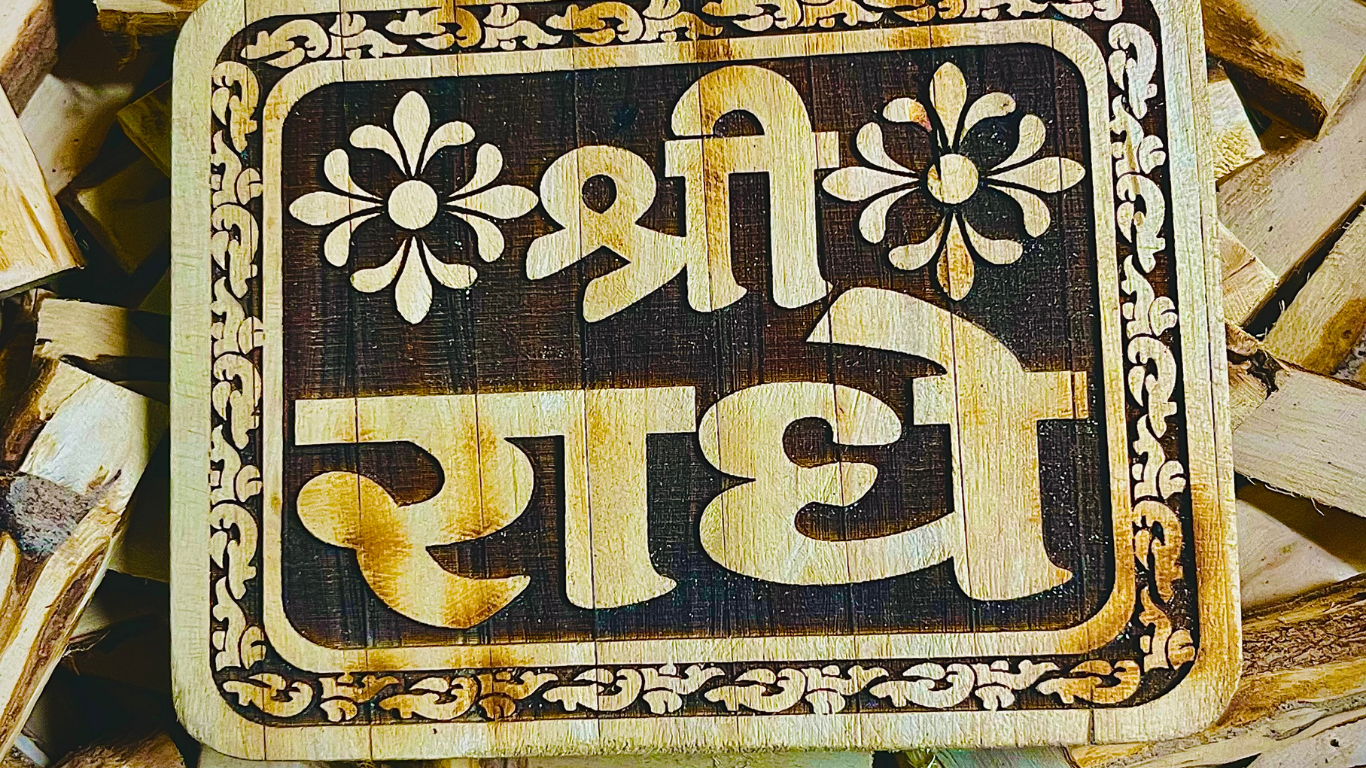
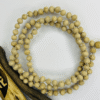
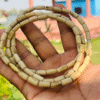
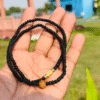
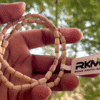
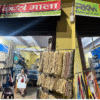
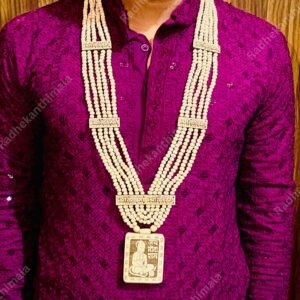
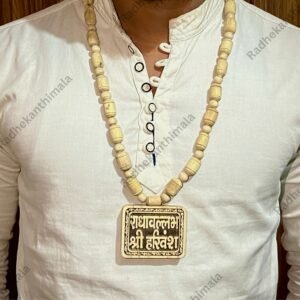
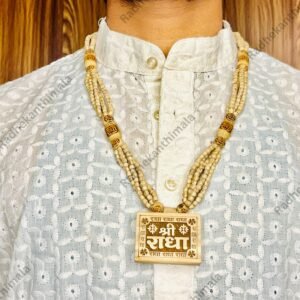


Add comment